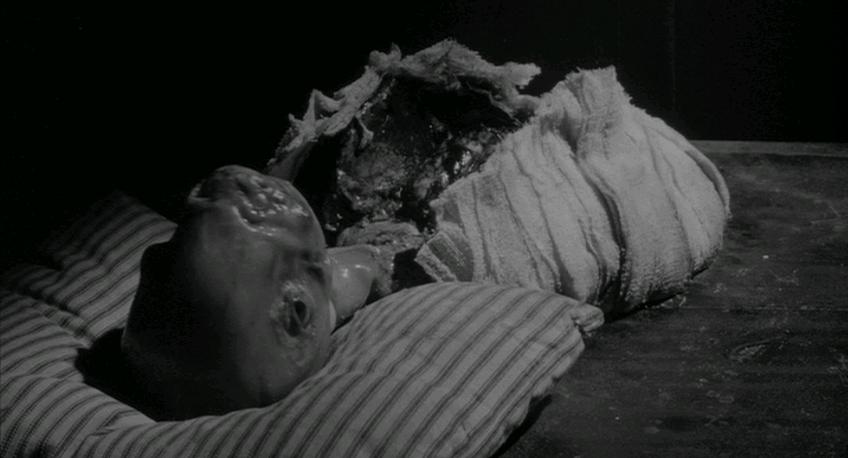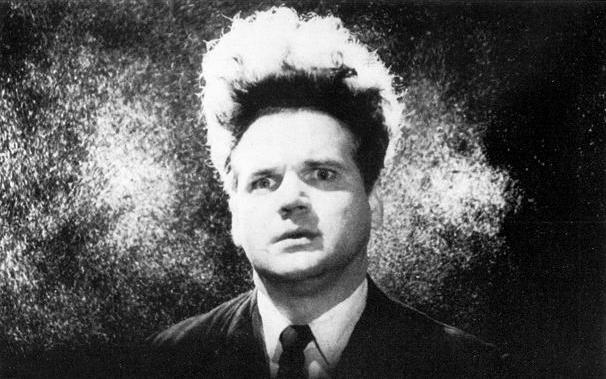I recently had the opportunity to watch David Lynch’s Eraserhead on Blu-ray. This was an especially momentous occasion, as I hadn’t seen this quite astounding surrealist nightmare of a film for many years. It’s a remarkable piece – definitely one of the strangest and most beguiling movies ever made, and I feel as if it’s been with me for most of my life. Which, in an odd way, it has.
I first became aware of Eraserhead back in 1978 when it was receiving its first UK release on the midnight art house circuit. Not that I knew such a thing existed back then because I was only ten. Our class had been taken on a school trip to the Sherman Theatre in Cardiff to see an afternoon of what turned out to be some quite dreadful interpretive dance. I can’t remember much of if now, but that doesn’t matter.
What mattered was the poster outside the theatre.
I’d been a die-hard horror fan for two years, had read Dennis Gifford’s Pictorial History of Horror Movies and Alan Frank’s Horror Films book over-and-over and with the absurd confidence of youth was now convinced that I knew everything there was to know about the genre. To quote From Beyond the Grave’s Sir Michael Sinclair I wore my knowledge about me like a cloak (the real cloak came later when I was taller) so when the battered old coach from Tredegar that had picked us up in Abergavenny finally drew to a halt outside the building one of my friends tapped my shoulder and pointed through the rain-drenched window. “What’s that one about then?” he asked.
And there it was – Jack Nance’s perplexed visage filling the picture, the words ‘Late Night Horror – 10.45pm’ at the top of the poster, the title of the film at the bottom. Of course I’d never heard of it – as far as my youthful self was concerned horror began with Caligari and ended with Cushing and Lee. What on earth could a film with that title and that picture possibly be about?
Attempts to research the title ended fruitlessly, mainly because Abergavenny newsagents weren’t the most well stocked, and unless you wanted The Beano (or Great Big Ones Monthly for those with more sophisticated tastes and a considerably greater reach to the top shelf) you were destined to be disappointed. And Eraserhead, its poster image burned into my brain, became one of those Holy Grails that I was determined to track down.
My next brush with the film was during the early days of the video revolution. Palace Pictures released the uncut version of Sam Raimi’s marvellous The Evil Dead, stirring up a storm of controversy that would eventually lead to the film being extensively cut in the UK. As I’ve already mentioned in a previous column I rented the film as soon as it came out, well aware that it probably wasn’t going to last on the shelves for very long in its unabridged form. Before the film itself started, Palace had thoughtfully provided a few trailers to some of its other releases. These days trailers are there on the whole to be fast forwarded through, but back then they were often the only chance to see even a smidgeon of some of the weird and wonderful films that were hardly ever written about, and if they were it was in underground publications that could only be obtained by mail order, the print almost illegible and the staples misplaced with cool indifference.
The trailers at the start of Palace Video’s first release of The Evil Dead were Kathryn Bigelow’s The Loveless, John Waters’ Female Trouble (and my God I wondered what the hell that would be like to watch) and, of course, David Lynch’s Eraserhead. I watched the cassette five times over the weekend that I first rented it, but I may have watched those trailers even more. Especially Eraserhead. Because the poster had fascinated me, the seemingly random assortment of black and white images used to actually sell the film gave me nightmares. If the poster was enigmatic and compelling, the trailer made me wonder if I actually wanted to see it; I wondered whether my brain might be irreversibly twisted out of shape by ninety-odd minutes of whatever the hell it was supposed to be about.
By then, of course, David Lynch had become famous. He’d directed The Elephant Man for Mel Brooks and garnered universal acclaim. As a result he was just finishing work on an adaptation of Frank Herbert’s Dune for Dino de Laurentiis. At the time, I was a subscriber to ‘the film buff’s bible’ Cinefantastique, who did a special double issue on it. Which also included a length article (with pictures) about Eraserhead.
Which is the first time I saw the baby.
 It was becoming more and more frustrating. The video shop didn’t have the film, and that was the only way other than television that you could see something in those days (remember that?). Over the course of six years my brain had accumulated a scary poster, a disturbing trailer, and a lavishly illustrated article that still gave nothing away in terms of what actually happened. But there were lots of pictures of ‘The Lady in the Radiator’ and an animated plasticene worm that, according to the article represented “voracious sexuality”. There was a picture of Jack Fisk as the terrifying ‘Man in the Planet’ who had apparently sworn he would kill Lynch if he ever saw him again for the painful makeup job he had had to endure.
It was becoming more and more frustrating. The video shop didn’t have the film, and that was the only way other than television that you could see something in those days (remember that?). Over the course of six years my brain had accumulated a scary poster, a disturbing trailer, and a lavishly illustrated article that still gave nothing away in terms of what actually happened. But there were lots of pictures of ‘The Lady in the Radiator’ and an animated plasticene worm that, according to the article represented “voracious sexuality”. There was a picture of Jack Fisk as the terrifying ‘Man in the Planet’ who had apparently sworn he would kill Lynch if he ever saw him again for the painful makeup job he had had to endure.
I pause now to allow contemplation of the fact that here was a film I had wanted to see for six years, that had been with me since my (comparative) youth, and which had only seemed all the more enticing with every scrap of memorabilia I could lay my hands on regarding it.,
Surely watching the film could only be a massive disappointment?
Channel 4 showed Eraserhead just before I was due to go to university, and it was better than anything I could have ever imagined. That god-awful industrial landscape! The X family! Those strange goddamn man-made chickebs and the stuff that squirted out of them! Why does Henry have a bowl of water filled with coins in the top drawer of his dresser? And how in God’s name did Lynch get that horrible baby thing to look so convincing?
I watched it once, and once was enough.
The next day I watched it again, and that was definitely enough.
I showed it to my brother to freak him out, and that was absolutely, definitely enough.
It was on when I was at university and I insisted to friends that we watch it.
And that really was enough.
Until last week. Last week I watched Eraserhead with my wife. I thought I’d forgotten it, but it all came flooding back. I realised how much I had truly loved this wild, weird, messy, obsessive, nightmarish film when I was younger, and how much I still love it now. There’s no one in the world like David Lynch, and that’s probably just as well. I love Eraserhead, but one of them is quite enough.
I think.
JOHN LLEWELLYN PROBERT
If you enjoyed John Llewellyn Probert’s column, please consider clicking through to our Amazon Affiliate links and buying some of his fiction. If you do you’ll help keep the This Is Horror ship afloat with some very welcome remuneration.
Buy John Llewellyn Probert fiction (UK)
Buy John Llewellyn Probert fiction (US)











2 comments
I need to watch this again. I really have only seen it once but it has stayed with me. I watched it on my own when I was at university, housemates all out, and loved it. When I told them about it later I found it difficult to explain quite why I loved it (and I used the word “weird” a lot). I’d love to see it again to see if what I think has stayed with me was actually there in the first place – it’s one of those kind of films.
Great piece, John.
the baby was the creepiest part!